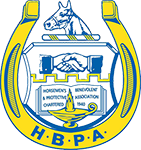By Jennie Rees
NEW ORLEANS–The National HBPA Convention's panel addressing Thoroughbred aftercare Thursday was charged with discussing solutions. It could not have been more timely, with the Horsemen's Benevolent and Protective Association confab occurring in a jurisdiction that has been reeling from the social-media uproar stoked by horses that have gone from racing at Louisiana's Delta Downs and Evangeline Downs to kill pens that sell horses for slaughter.
“Now everything is connected,” said Patrick Richmond, president of Louisiana Horse Rescue Association. “Something that happens in some remote corner of the state, all of a sudden it's all over the nation. Because everyone has a video camera, everyone is on Facebook, on Youtube. It takes only one horse to bring just the huge load of bad publicity down on the industry. The publicity falls on the breeder, falls on the owner, on the racetrack. And it really is only one individual causing all of this. But the general public doesn't really know much about our industry. They just know there's a horse that's abused.”
And that's where the Thoroughbred Aftercare Alliance comes in. The industry-wide program, launched in 2013, accredits aftercare facilities that rehab and retrain racehorses for second careers. TAA also provides funding to its affiliates, now nearly $3 million a year to 64 accredited organizations. The Louisiana Horse Rescue isn't one, but hasn't applied. Stacie Clark, the operations consultant who oversees the TAA, said that's going to change and Louisiana Horse Rescue will be mentored through the process with hopes of becoming the 65th organization.
Richmond said racetracks need to partner with the TAA and an organization such as Louisiana Horse Rescue to send the message, “We're opposed to this happening to horses. We're actively trying to find places for horses to have homes and successful careers after racing.”
“I do think the racetracks are coming around,” said Michele Rodriguez, founder and president of Elite Thoroughbreds in Folsom and first vice president of Louisiana Horse Rescue. “Because they're seeking us, as opposed to us going to them. There's been so much bad publicity about the outcome of some of the horses in the state that they don't want that stigma attached to the tracks. Boyd [Gaming], which controls two of the tracks in Delta and Evangeline, has asked requested Pat and I visit with them. They're going to try to work with us, and the racing commission is putting together a task force [including] the other two tracks [Louisiana Downs and Fair Grounds], and hopefully the department of agriculture. So we can hopefully shut down some of the kill pens, and they're going to help fund us.”
Boyd Gaming has a policy that permanently revokes stall privileges at its tracks if a trainer's horse is sold for slaughter. However some of the horses going to kill pens aren't stabled stable at a track, it was pointed out.
Moderating the panel at the Astor Crowne Plaza, Clark suggested that Beyond the Wire, Maryland racing's aftercare initiative launched last year, could provide a blue print for Louisiana and other states. Beyond the Wire–funded by the Maryland Jockey Club, the Maryland Thoroughbred Horsemen's Association and the Maryland Horse Breeders Association, as well as per-start contributions from owners and jockeys–serves as a conduit, sending retired racehorses to TAA facilities in the state.
“Most of our horsemen want to retire their horses safely, and a lot of people successfully retire their racehorses to good second careers without a program,” said Beyond the Wire program administrator Jessica Hammond. “But there are some who thought they were getting good homes, and it turned out two weeks or a month later that they weren't. Working with the TAA gives us an extra security net….We want to show the public that our industry cares for our horses. That's a huge deal nowadays, and it should be. This is not only ethical–that's the main reason–but it's also a marketing issue.”
Louisiana HBPA president Benard Chatters vowed to “commit our lobby effort to come up with a funding mechanism to help with Thoroughbred aftercare.” He added, “There's no one size fits all to this problem” and that horsemen also must be protected from being unfairly sanctioned if a horse once in their care is sold for slaughter by someone else.
“That's why it's important to have a 'first exit' (from racing) and working with accredited groups,” Clark said. “If you have that first exit, you don't have that. Because you know the trainer put the horse in the right spot.”
One problem surfacing in Louisiana–and elsewhere–are people whose business plan involves trying to resell horses to previous owners to keep it from going to slaughter. Eric Hamelback, the National HBPA's chief executive officer, also urged caution to get the facts, to make sure a horse portrayed on social media as a racehorse sent to a kill pen is actually a Thoroughbred or an active racehorse.
“You have to be real careful with some of these folks who are trying to get you to help by sending more money, because it sometimes just exacerbates the problem…You can't put right or wrong on emotion. You just have to remember we're trying to get it at that first step. We need to do our due diligence and just educate the Thoroughbred side of the world. We can't worry about the other side.”
Not a subscriber? Click here to sign up for the daily PDF or alerts.






